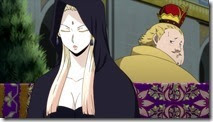 |
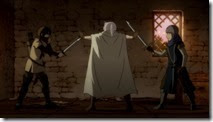 |
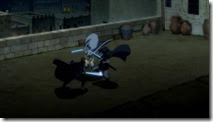 |
When Tanaka Yoshiki started the Arslan Senki novels (he’s still writing them, though the events of this episode were written more than two decades ago) the Taliban didn’t even exist as a named organization, much less one most of the developed world had heard of. So clearly he wasn’t basing their invasion of Pars on the Taliban takeover of Afghanistan, though the burning of every cultural treasure they could get their hands on (including many priceless Hindu and Buddhist relics dating back thousands of years) was part of parcel of both the real and fictional event. But the world didn’t begin in 1994, and history has a tendency to be cyclical.
The question of “civilization” and what it means to be civilized is very much at the heart of Arslan Senki, it seems to me. The way both Lusitania and Pars are depicted here is troubling, and it’s intended to be. I won’t deny that this was addressed more subtly in the novels than the manga (and the anime which is based on it), but I think that’s a function of medium more than anything. Arakawa-sensei simplified some of this conflict, made it more black and white, and added material at the beginning of the series to bring the question of cultural bias to the forefront in unmistakable terms. And with Etoile’s return to the narrative, we’re starting to see the story’s focus return to that theme.
The way in which these two cultures are presented is not even-handed by any means, though whether you should chalk that up to cultural chauvinism on the part of Arakawa and/or Tanaka is open to debate. There are limits to cultural relativism, to be certain – I would argue that the Allies and Axis should not be presented on equal moral terms, for example. But we’re talking about a slave slate in Pars here, and while they certainly don’t come off well, as the story has progressed Lusitania has increasingly been portrayed as the far more despicable power. At least we are seeing some disquiet in their own ranks over their treatment of civilians and the destruction of Pars’ culture, but it’s clearly a minority view. And the inherent hypocrisy of their belief system is certainly painted in a harsher light than that of the Pars belief system (though that hypocrisy isn’t ignored either).
Against this backdrop we have a very arresting personal story playing out, and especially in Arslan’s case the two themes are never separated by more than a hair’s breadth. The narrative has splintered, with the kids (Arslan, Elam and Etoile) in one branch, Gieve and Falangies in another, and Daryun and Narsus having gone to Ectabana to check up on things for themselves. Interesting things are happening there – we finally get our first hard evidence of fantastical developments, a seeming wizard complete with crystal ball who claims credit for the fog that won the battle for Lusitania and informs Silver Mask of Kharlan’s death. He tells S.M. in no uncertain terms that he can only rely on magical support as long as “his people” see a benefit in it. Clearly, Hermes has pulled out a lot of stops – and likely created a great deal of debt, karmic and practical – in order to fulfill his mission of restitution against those who betrayed his family.
Meanwhile, Arslan is struggling with being relatively useless compared to his compatriots – quite a natural thing for a 14 year-old boy from a warrior tradition forced to rely on others to keep him alive. There can be no question, though, that facing down a Lusitanian squad armed with naught but a dirty hoe was less than smart, no matter that an atrocity was about to take place – but I do give him credit for being smart enough not to reveal his royal sword. It’s only Etoile’s timely arrival which prevents Arslan’s cause from suffering an ignominious end, which calls out the selfishness of his selfless act.
Whenever Arslan and Etoile get together the personal and philosophical sides of Arslan Senki collide head-on, and that’s certainly the case here. Etoile still doesn’t know Arslan is more than just another pampered noble, of course, and she (I’m assuming about that) does have something of a sense of personal honor – she remembers what Arslan did when they met, and truly seems put off by the shameful behavior of the army. But Etoile’s cultural myopia is very real – she seems to see no conflict whatsoever between the opposition to slavery and the principle that if a person isn’t a believer in Yaldaboath their life has no value. This is all part of Arslan’s continuing education it seems – growing evidence that belief systems in themselves are things never to be trusted implicitly.
Meanwhile, back at the adults’ table, we get maybe our best fight of the series so far as Hermes, Narsus and Daryun face off. And while Daryun does manage to knock that mask off, revealing a Zuko-like visage (rather, perhaps, Zuko has a Hermes-like visage) the invincible Daryun is forced to admit that if Narsus hadn’t arrived to help, he’d have been in trouble in single combat. The two are forced to retreat with incomplete intelligence and their work incomplete – not to mention the capital still in a terrible state. But they know enough to paint a picture – Innocentius (the degree of whose whose buffoonery seems out of place in the story) intends to marry Tahemanay (much to the disgust of his chief priest, who practically threatens his ruler’s life in public). One senses that things are beginning to fall apart within the Lusitanian ranks – their victory having been cobbled together among forces that have no loyalty to Lusitania or anyone but themselves.


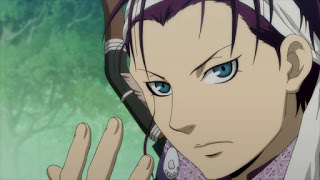
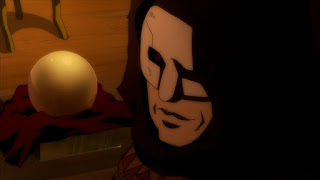
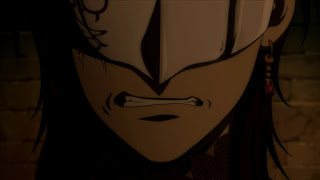
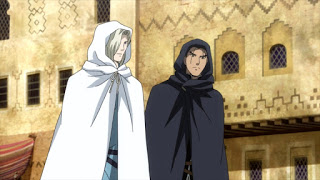
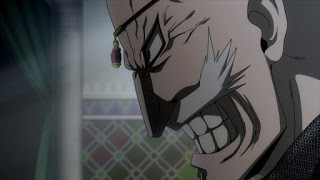
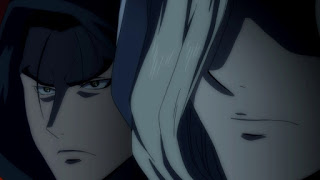
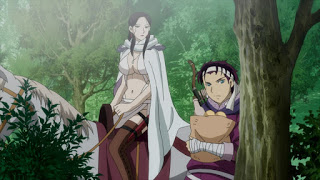

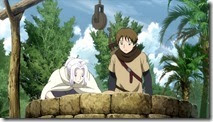
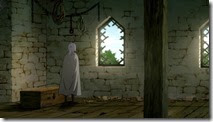
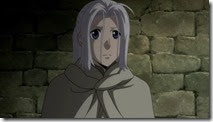
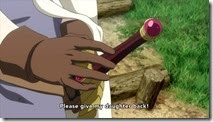
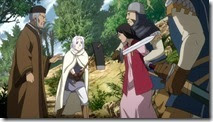
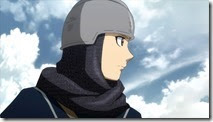
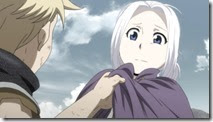
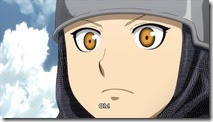
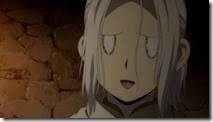
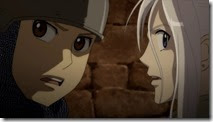
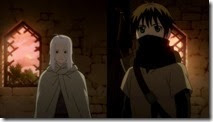
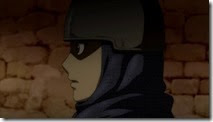
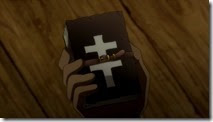
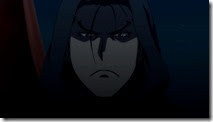
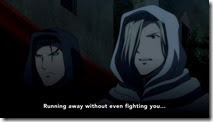
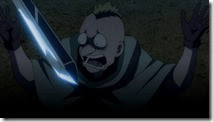
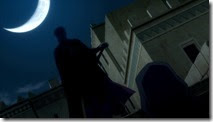
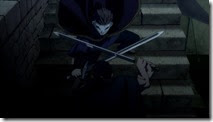
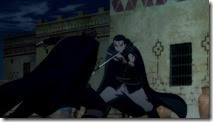
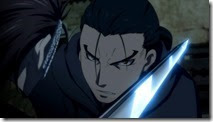
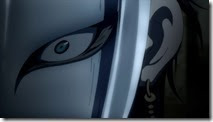

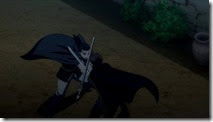
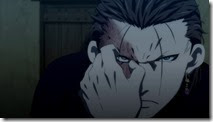
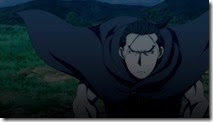
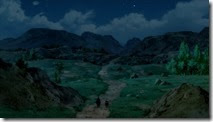


Chrysostomus
June 1, 2015 at 5:13 pmYikes… The QUALITY this week was horrible. All the budget went to that fight scene… which was very nice, but, in my opinion not worth half an episode's worth of crappy animation.
Earthling Zing
June 2, 2015 at 12:15 pmGreat review, well-written fantasy series are usually very grounded in real life history. The series could use a bit less of the cartoonish stuff though, it detract from the experience a bit, especially if they want to pull long cuts without any animation…
Font is a bit messed up at the last few sentences, made it a bit difficult to read.
admin
June 2, 2015 at 4:48 pmAll a function of the workaround, sorry.
I did muse a bit on the dichotomy between the comic scenes and the serious ones, which I would agree don't mesh perfectly. But I think it works OK, and at this point it just feels as if that subject as been beaten to death a bit after Yona, Shigatsu, Soredemo Sekai etc.
Zeta Zero
June 7, 2015 at 10:02 amI have to admit, Etoile's face faults took me out of the show.